TLDR;
Dogs snore for several reasons — breed, weight, sleep posture, or airway issues. Most of the time, it’s harmless, but if your dog starts snoring suddenly, snores loudly, or shows signs of illness, it’s time to speak with a vet.
Why Do Dogs Snore and When Should You Be Concerned?
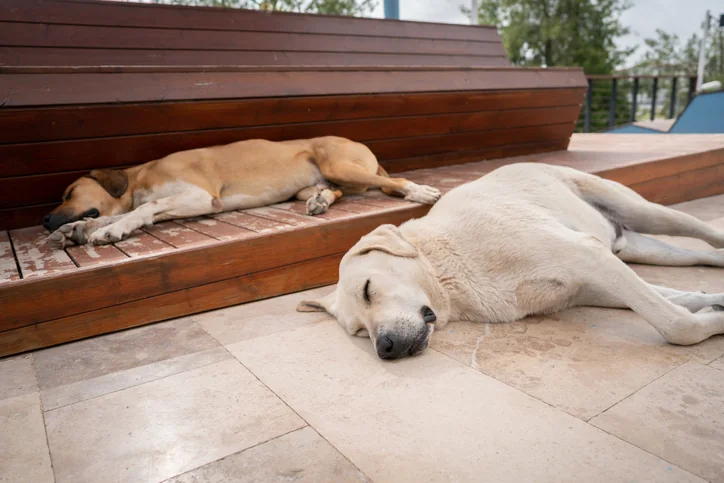
Snoring in dogs happens when airflow is partially blocked during sleep, causing tissues in the throat or nose to vibrate. While some snoring is normal — especially in flat-faced breeds — it can also signal deeper health issues that need attention.
What Causes Dogs to Snore?
Snoring is usually a sign of airflow obstruction. This can be anatomical, environmental, or health-related.
How and Why Dogs Snore
- Restricted airflow: Tissue vibrations from partial obstruction cause the snoring sound.
- Soft palate involvement: The soft tissue at the back of the mouth vibrates due to pressure changes during breathing.
- Nasal blockages: Congestion or narrow nasal passages reduce smooth airflow, especially during deep sleep.
Important: Not all snoring is cause for concern — context and other symptoms matter.
Common Reasons Why Dogs Snore
Each dog is different, but here’s a detailed breakdown of the most common reasons for snoring and how to recognize them.
1. Breed-Specific Anatomy (Especially Brachycephalic Dogs)
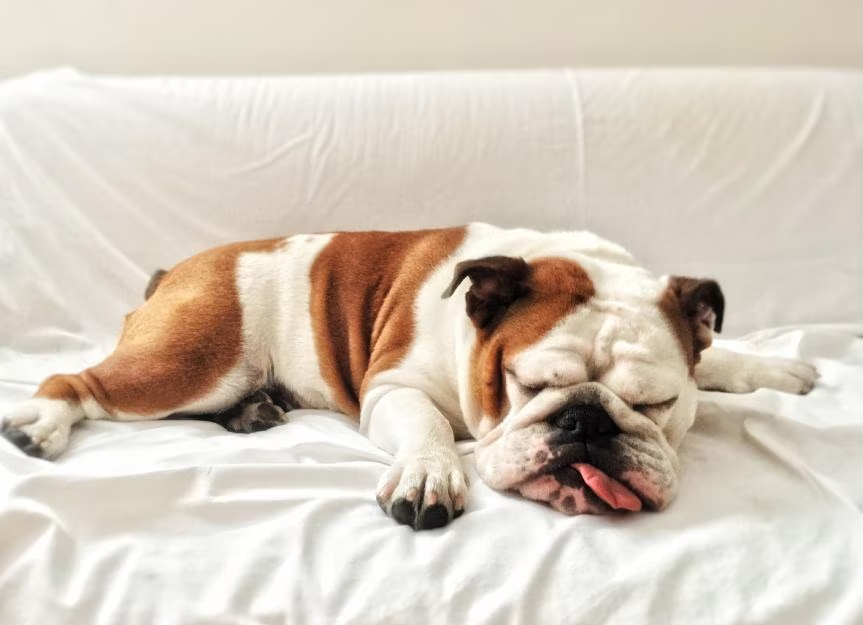
Some breeds are born snorers due to how they’re built.
Why it happens:
- Short snouts and narrow nostrils cause resistance in the upper airways.
- Elongated soft palates hang too low and interfere with airflow.
- The windpipe may be narrow or partially collapsed, making breathing difficult.
High-risk breeds:
- Pugs
- English Bulldogs
- French Bulldogs
- Boxers
- Boston Terriers
What to watch for:
- Gurgling or wheezing sounds while sleeping or awake
- Heavy panting even after light activity
- Snoring so loud it wakes you or them up
These dogs often require lifelong breathing management and sometimes surgery.
2. Obesity and Excess Weight
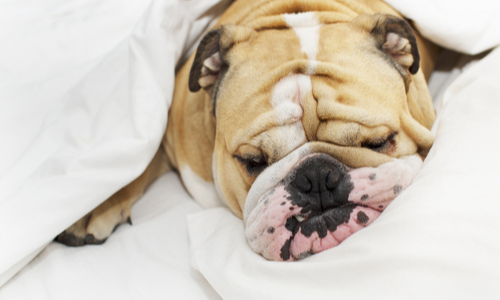
Fat doesn’t just sit on the outside — it compresses internal organs and structures too.
How obesity causes snoring:
- Extra fat accumulates around the neck and throat
- This narrows the airway, especially when lying down
- Fat may press against the diaphragm, reducing breathing efficiency
Signs your dog’s weight may be contributing:
- Loud snoring started gradually over time
- Dog seems to struggle in hot weather or tires easily
- Vet mentions body condition score above 5 (on a 9-point scale)
Action steps:
- Introduce calorie-controlled diet
- Increase low-impact exercise like walking or swimming
- Discuss feeding plans with a vet or take a pet nutrition course (like those at Careers Collectiv)
3. Allergies or Respiratory Infections

Inflamed tissues make airflow more difficult — and noisier.
Common triggers:
- Environmental allergens: Dust, pollen, mold, smoke
- Food allergies: Grains, proteins like beef or chicken
- Upper respiratory infections: Kennel cough, viral or bacterial colds
Symptoms to watch:
- Runny nose or watery eyes
- Sneezing or coughing along with snoring
- Red or itchy skin around the face or paws
- Snoring worsens during certain seasons or after exposure to specific environments
What to do:
- Clean bedding frequently
- Use air purifiers
- Ask your vet about antihistamines or allergy testing
4. Sleeping Position

This is one of the most benign causes of snoring.
When sleep posture matters:
- Dogs that sleep on their back allow the tongue to fall backward, partially blocking the throat
- Snoring stops or reduces when they sleep on their side or belly
How to help:
- Provide a side-support dog bed (bolster style)
- Avoid letting your dog sleep with its head lower than its body
- Encourage side-sleeping by placing pillows or supports in their bed
If changing sleep position fixes the snoring, it’s usually not a concern.
5. Dental or Oral Health Problems
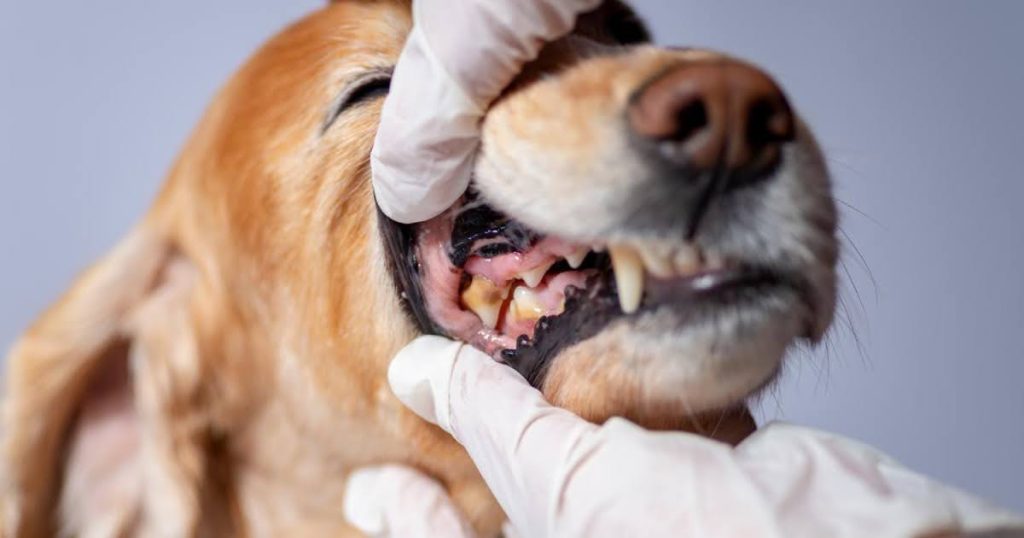
This is a commonly ignored cause that can lead to serious complications.
Dental issues that may trigger snoring:
- Tooth abscesses: Infections cause swelling that compresses airways
- Gum disease: Inflammation spreads from the mouth to nasal passages
- Tumors or growths in the oral cavity that partially block airflow
Clues it could be dental-related:
- Bad breath or visible plaque buildup
- Reluctance to chew hard food or toys
- One-sided facial swelling or discharge
Preventive care:
- Brush your dog’s teeth regularly
- Schedule professional cleanings
- Include dental checks in annual vet visits
When Should You Be Concerned About Your Dog’s Snoring?
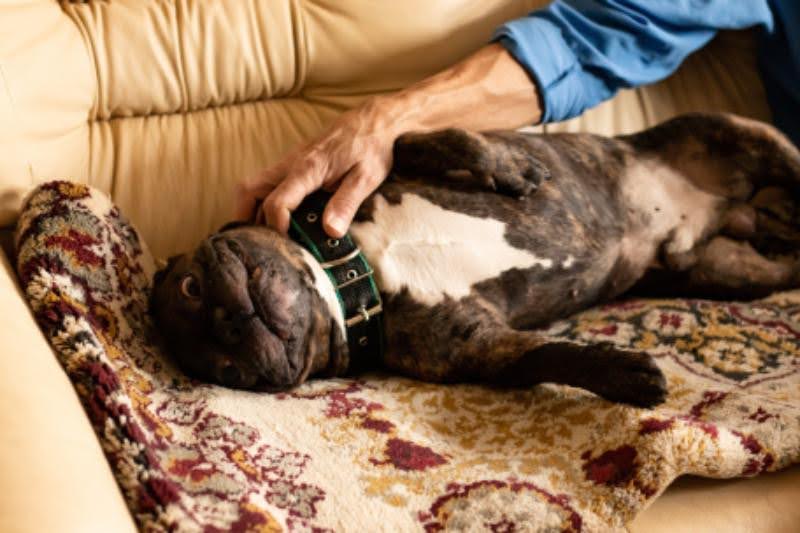
Snoring alone isn’t always a red flag — but paired with other changes, it can indicate something serious.
Sudden or New-Onset Snoring
Red flags:
- Snoring appeared out of nowhere
- No recent weight gain or change in sleeping area
- Louder than usual or sounds like gasping
Possible causes:
- Airway obstruction (foreign object, tumor)
- Swelling from infection or allergic reaction
- Onset of a condition like sleep apnea
Snoring Alongside Other Symptoms
If your dog is snoring and showing other signs, it’s more than just a noisy sleeper.
Watch for these symptoms:
- Lethargy or refusal to play
- Coughing or wheezing
- Loss of appetite
- Labored breathing
- Blue-tinged gums or tongue (sign of oxygen deprivation)
These symptoms point to:
- Sleep apnea
- Advanced respiratory infection
- Heart or lung conditions
Higher Risk in Certain Breeds and Ages
Dogs with flat faces or chronic health conditions need closer monitoring.
At-risk groups:
- Senior dogs with weakened muscles or obesity
- Dogs with a history of asthma, bronchitis, or heart murmurs
- Puppies born with anatomical deformities
Be proactive:
- Keep an eye on changes in snoring pattern
- Schedule regular vet checkups
- Ask your vet about breed-specific airway issues
Can Dogs Get Sleep Apnea?

Yes — though rare, canine sleep apnea is real and dangerous.
What it looks like:
- Loud snoring followed by moments of silence
- Sudden gasps or jerks during sleep
- Daytime sleepiness or mood changes
What causes it:
- Obesity
- Brachycephalic anatomy
- Nasal polyps or tumors
Risks of ignoring it:
- Repeated oxygen deprivation
- Heart strain
- Cognitive dysfunction over time
Diagnosis requires:
- Physical exam
- Sleep study or overnight observation
- Possible imaging (X-ray or CT scan)
Chronic Conditions That May Cause Snoring
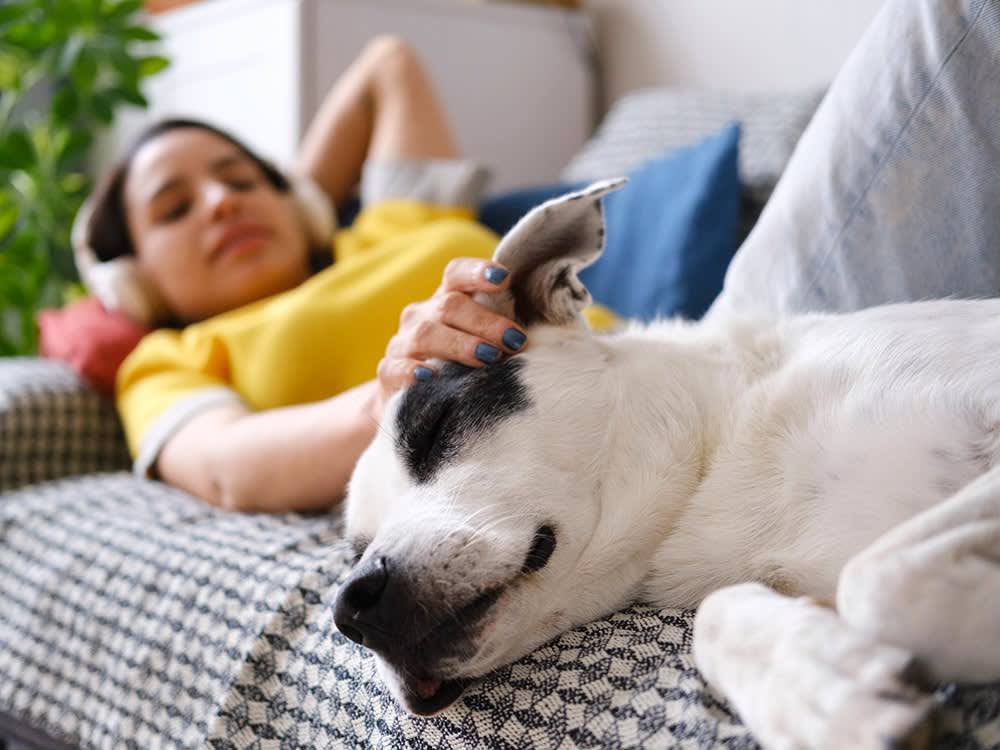
Some long-term respiratory conditions can fly under the radar but lead to persistent snoring.
Common chronic issues include:
- Chronic bronchitis: Constant inflammation leads to narrowed airways and mucus buildup
- Collapsing trachea: The windpipe becomes weak and flattens during breathing
- Laryngeal paralysis: Nerves controlling the voice box malfunction, causing airway obstruction
Treatment options:
- Inhalers or nebulizers
- Anti-inflammatory drugs
- Surgery in advanced cases
What You Can Do to Help Your Dog Stop Snoring
1. Keep Them at a Healthy Weight
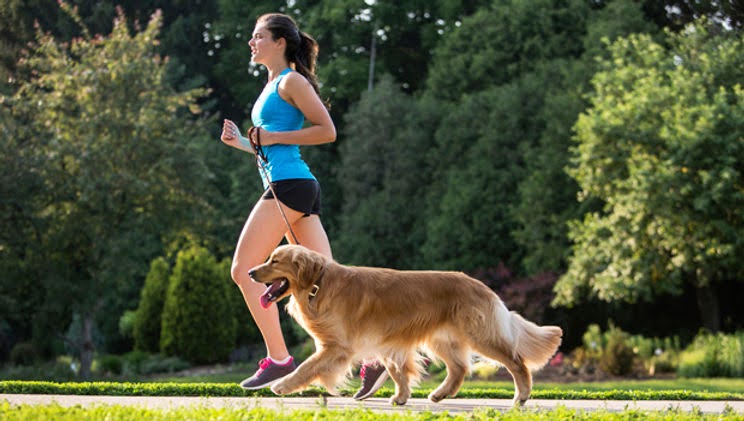
Excess fat is a direct cause of many airway issues.
- Feed a balanced, portion-controlled diet
- Use slow-feeder bowls to prevent overeating
- Get guidance from animal nutrition experts (like our instructors at Careers Collectiv)
2. Improve Their Sleeping Conditions
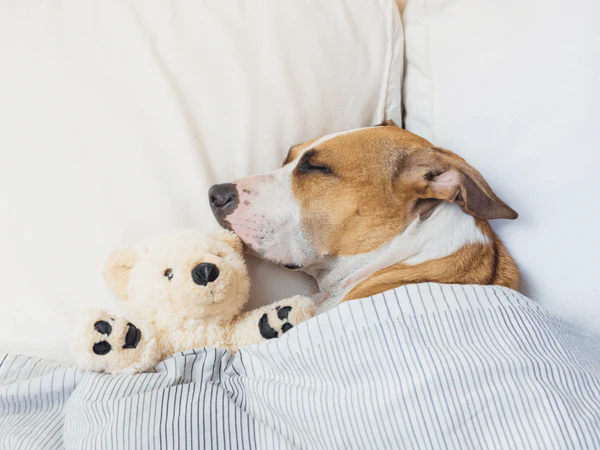
Your dog’s environment matters more than you think.
- Use hypoallergenic bedding
- Keep the room well-ventilated and dust-free
- Raise the head slightly to improve airway positioning
- Choose supportive beds that encourage side-sleeping
3. Address Allergies Promptly
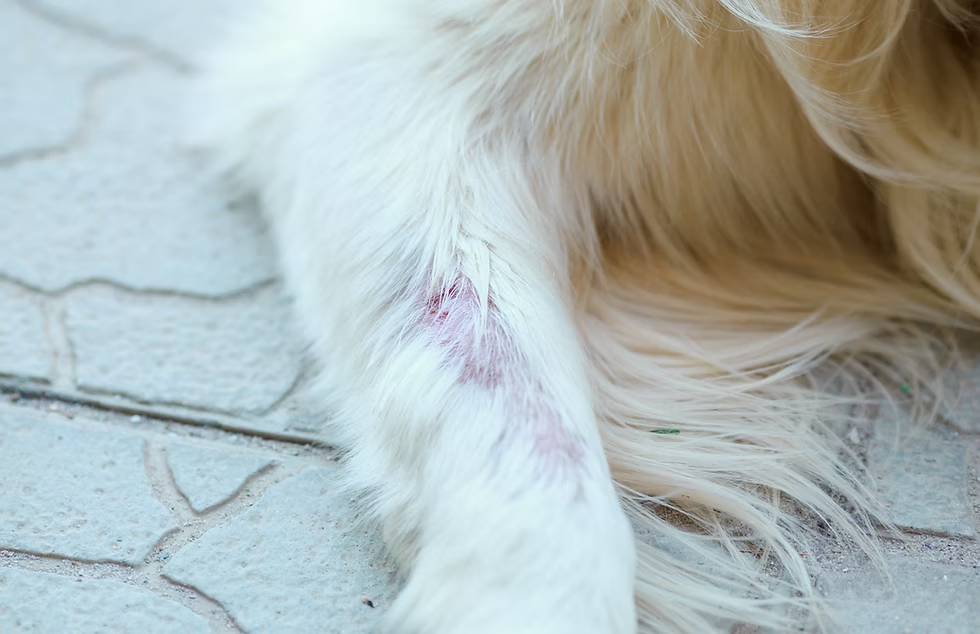
Unmanaged allergies inflame your dog’s airways and make snoring worse.
- Switch to grain-free or hypoallergenic food if food intolerance is suspected
- Use pet-safe cleaning products
- Bathe your dog regularly to reduce pollen exposure
4. Prioritize Vet Visits
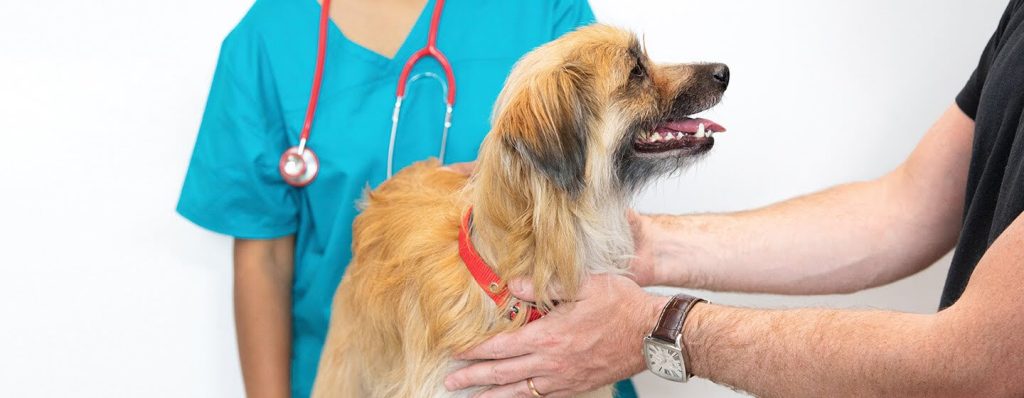
Routine vet care is your best line of defense.
- Annual exams can catch airway or dental issues early
- Diagnostic imaging may be recommended for chronic snorers
- Vets can refer you to specialists if surgery is needed
Questions Dog Owners Often Ask
Is it ever OK for a dog to snore loudly?
Only if it’s always been that way, especially in breeds like Bulldogs. Otherwise, it should be evaluated.
Can I stop my dog’s snoring naturally?
Sometimes — weight loss, better sleep posture, and managing allergies can help.
Does dog snoring mean they’re dreaming?
No. Dreaming dogs may twitch or bark, but snoring is physical — it’s airflow being blocked.